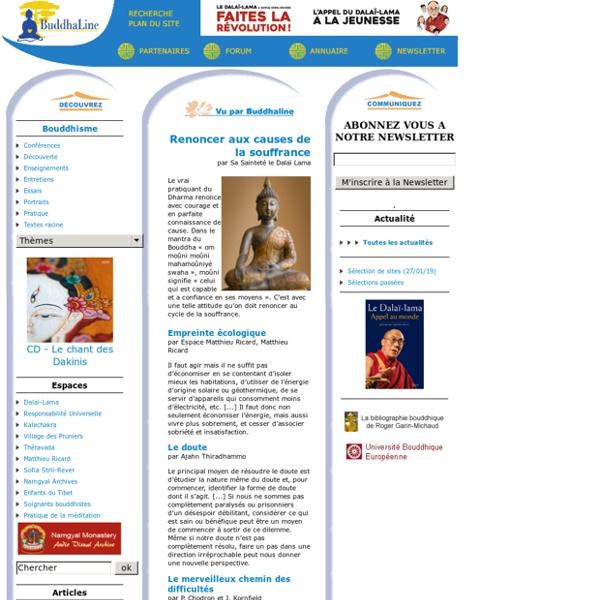Conventional and Ultimate Truth
Conventional and Ultimate Truths Ultimate truths of Buddhism are different from the conventional truths of everyday life. This can be confusing for the thoughtful person.
HOME : Yann Arthus-Bertrand, Luc Besson
<div style="padding:5px; font-size:80%; width:300px; background-color:white; margin-left:auto; margin-right:auto; border:1px dashed gray;"> Internet Archive's<!--'--> in-browser video player requires JavaScript to be enabled. It appears your browser does not have it turned on. Please see your browser settings for this feature. </div>
Understanding Buddhist Scriptures
Is there a Buddhist Bible? Not exactly. Buddhism has a vast number of scriptures, but few texts are accepted as authentic and authoritative by every school of Buddhism. There is one other reason that there is no Buddhist Bible. Many religions consider their scriptures to be the revealed word of God or gods. In Buddhism, however, it is understood that the scriptures are teachings of the historical Buddha - who was not a god - or other enlightened masters.
Buddhist philosophy
The Buddhist Nalanda university and monastery was a major center of learning in India from the 5th century CE until the 12th century.[1] Particular points of Buddhist philosophy have often been the subject of disputes between different schools of Buddhism. These elaborations and disputes gave rise to various schools in early Buddhism of Abhidharma, and to the Mahayana traditions such as Prajñāpāramitā, Madhyamaka, Buddha-nature and Yogācāra. Historical phases of Buddhist philosophy Edward Conze splits the development of Indian Buddhist philosophy into three phases.
Vita e opere di Nagarjuna (Douglas Berger)
2. Il Metodo Scettico di Nagarjuna ed i suoi scopi Al cuore di ciò che è chiamato ‘scetticismo’ vi è il dubbio, una sospensione di giudizio sulle condizioni delle cose o sulla correttezza di alcune asserzioni. Ci sono naturalmente molte cose, sia nel mondo e in ciò che le persone dichiarano sul mondo di cui si può essere dubbiosi, si può accettarle, rifiutarle, o esserne scettici. Ma oltre alle molte differenti cose di cui può esservi il dubbio, ci sono anche diversi modi di dubitare.
Buddhist Monsters – Inside and Out
While there is no shortage of serene and benevolent buddhas, Buddhist folklore abounds with hell-raising zombies, vampires, ghouls, and ogres. But they’re not just the stuff of myth and legends. Depending on whom you ask, these ferocious monsters are thought to be as real as you or me, or serve as potent symbols of our less enlightened sides.
Nagarjuna: le cose sono solo relazioni
Questo articolo è tratto da «la Lettura» #315, numero speciale a 64 pagine, in edicola fino a sabato 16 dicembre Capita poche volte di incontrare un libro capace di influenzare nettamente il nostro modo di pensare. Ancora più raramente di incontrarne uno di cui non sapevamo nulla.
Chinese Buddhist Encyclopedia
Two people from Buddhism & Australia, Vello Vaartnou and Marju Broder represented Australia at the UC Berkeley PNC conference that was held on 16-18 August, 2016 in Los Angeles. The PNC was founded at the University of California, Berkeley and it encourages scholars, academic institutions, and universities to collaborate and exchange their academic resources and research expertise. It is really wonderful, that Western Australia which is usually known for the mining boom, was represented by two people who deal with the academic aspect of Buddhism on international level.
Canti di Milarepa sul non attaccamento a famiglia, amici e ricchezza — Study Buddhism
Milarepa aveva una sorella che insisteva affinché lui trovasse moglie e avesse una casa e figli, ma invece Milarepa se ne andò di casa e incontrò il suo maestro, Marpa. Quando sua sorella venne a sapere che Marpa era sposato e che aveva casa e famiglia, cercò di fare pressioni su Milarepa. “Perché non fai come fa il tuo maestro?” Domandò lei.
La vita di Gampopa — Study Buddhism
La prima volta che Gampopa udì il nome di Milarepa fu quando stava circoambulando uno stupa lungo una strada e udì per caso una discussione tra tre mendicanti. Uno si stava lamentando continuamente della carestia presente nel paese e di come non avesse mangiato da tanto tempo. Un altro gli rispose che avrebbero dovuto vergognarsi e non parlare sempre di cibo, per timore che il bhikshu che stava circoambulando lo stupa potesse sentire, il che sarebbe stato estremamente imbarazzante. “Inoltre”, disse, “non siamo gli unici a non avere nulla da mangiare.
Portail:Bouddhisme
Une page de Wikipédia, l'encyclopédie libre. Lumière sur… [ modifier ] Le Bodhisattva Le Bodhisattva, l'« être d'Éveil » désigne un futur Bouddha à partir du moment où il engendre et actualise la Bodhicitta, c'est-à-dire l'« esprit d'Éveil » par le vœu de l'accomplir afin d'enseigner à tous les êtres sensibles la voie de la Libération. La « carrière du bodhisattva » consiste en la pratique des six ou dix Perfections de vertu ; le Bouddha ayant lui-même suivi cette voie avant d'atteindre l' « insurpassable parfait Éveil ». Beaucoup de traditions bouddhistes considèrent que nous sommes déjà cette Nature-de-Bouddha, et que la tâche consiste à la laisser s'épanouir en nous.



